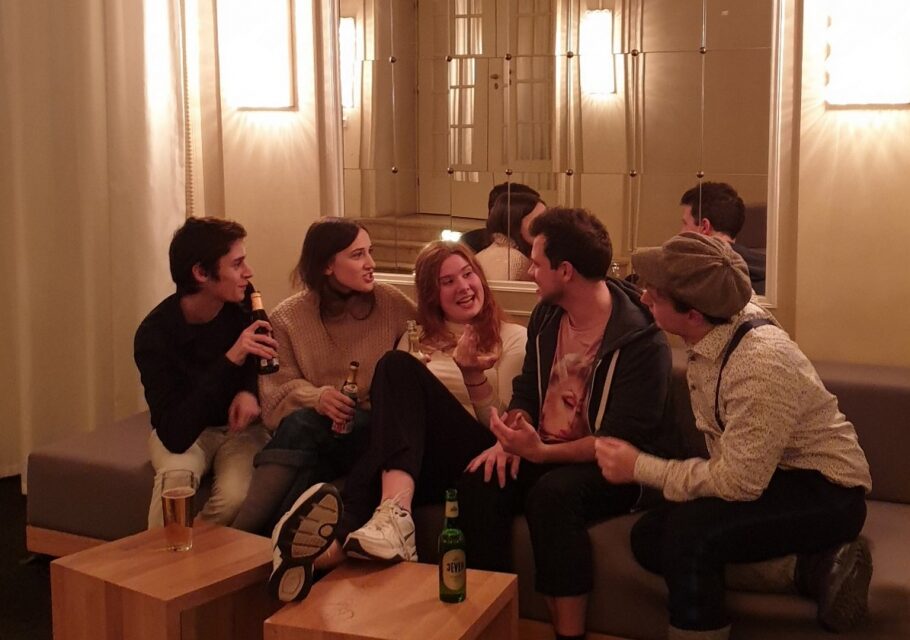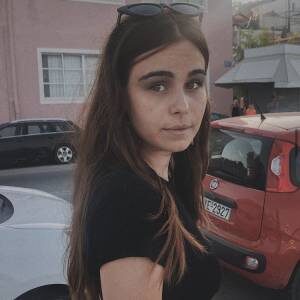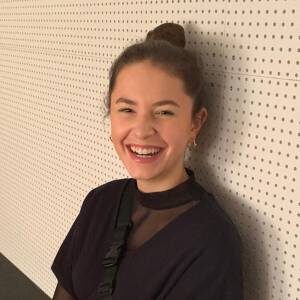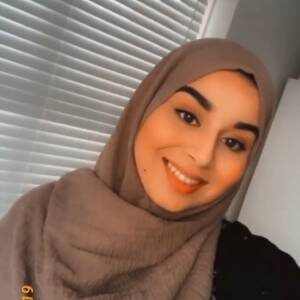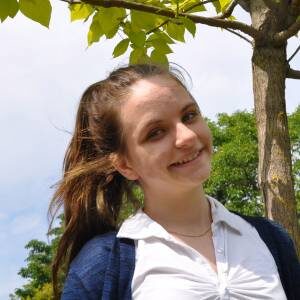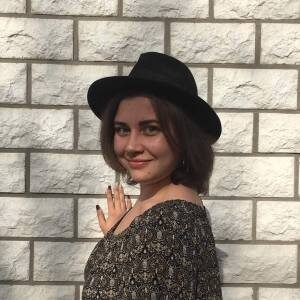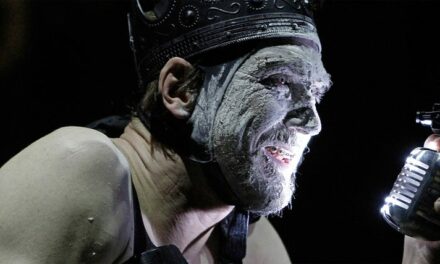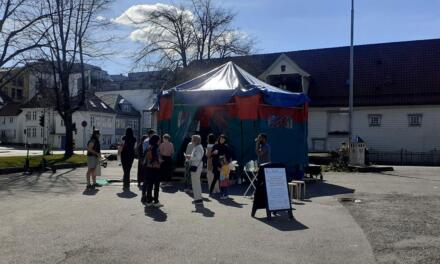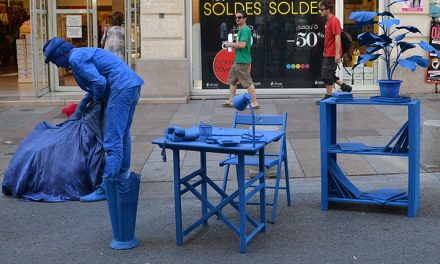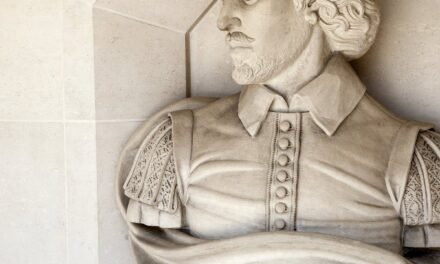Young Europe III
Raising young people’s voices across Europe, exploring their hopes and dreams, their fears and insecurities, and developing a new European theatre repertory inspired by this, was at the core of the Young Europe III project. Not only were teenagers from Germany, Hungary, Romania, Slovakia, the Netherlands, and Austria involved in the performative research and production processes but also invited to enter into an in-depth dialogue about the topics as part of a Young Europe Festival in 2020. However, due to the Covid-19 pandemic, their gathering shall be postponed. But their voices will still be heard!
Georgiana From Craiova Says:
YOUTH—what a powerful and strengthening word, full of hope, fear, uncertainty, and the brightly-colored prospects of a better future. It has always been thought that the younger generation will be the one that dares to soar into the unstable state of our society and take the initiative to mitigate already-existing problems. To be honest, there is a certain tendency to place considerable pressure on the shoulders of the youth, considering them individuals from whom everyone expects glorious deeds.
To me, YOUTH is indeed a powerful and strengthening word, not only because of the great expectations with which we are regarded, but also because I know in my heart that we are the ground-breakers, the ones that break the mold. We are young, in our teens, and yet this does not inevitably imply that we shouldn’t have a voice. We are young, far away from the hectic and poisonous environments of our leaders, therefore we are more likely to express a clearer opinion, not being restrained by any boundaries and social restrictions. Injustices in our faulty system exist all around the world, and hence, as citizens of this globe and well-aware of the current situation, it is our duty to intervene and take a stand. Whether we are talking about our educational system or the level of pollution that wreaks havoc on the environment, we are responsible for creating a safer and more harmonious world in which one can properly thrive as well.
When tackling this extremely delicate and barely definable subject of changing the world it is essential to affirm one point: Change starts with yourself! It is absolutely impossible for us to fight wars or stop famine. Instead, we, as the proud representatives of the younger generation, must acknowledge that our everyday actions and activities are strictly connected to what happens on a wider level. Therefore, it is only in our power to create ourselves as our most intense version and accept this as a form of uprising against the appalling problems of our society. We need to make our voices heard and we deserve to be treated with further consideration as humans with the ability to assert steady and valuable viewpoints towards our demands, ranging from school, health, culture, and environmental issues.
A valuable proof of the impact of YOUTH is the case of Greta Thunberg, the seventeen-year-old environmental activist for climate change who had the courage to speak out about the horrible consequences of pollution. She is an icon for the young, full of ideas, fearless, high-spirited, and prepared to fight against inequality.
There has always been a therapeutic and alleviating effect that the idea of future had upon the conscience of human beings, representing the one period in which the eventuality of progress and improvement was underscored; thus, we look forward to being not merely witnesses, but important actors of change on the complex stage of this world.
Georgiana (18), Gia for short, just finished the eleventh grade at “Fratii Buzesti” National College in Craiova (Romania) and is planning to pursue a career in acting. She is very keen on singing and playing the guitar and she is part of a local band. She loves reading, writing, and learning all kinds of new things and considers herself to be a professional dreamer!
Chiara from Karlsruhe says:
About the European Future—What does the future of Europe look like? A question that many have probably already asked themselves, especially in times of Brexit. When you hear the word Europe, you think directly of the European Union, because the future of Europe is strongly dependent on the EU. When I think about the future, many things come to my mind, which are not only specifically addressed to Europe, but have a general validity. Important topics are the climate, asylum, and migration policy, the economy and not to forget the increasing digitalization and globalization.
We average citizens always think that our actions have no influence, but we can do much more than we think. We have the right to vote, which we should use to guide the decisions that affect us all. Elections cannot be taken for granted, because democracy is not everywhere. Democracy is an important part of the EU and also of Europe, which we should not under any circumstances ignore and which should be maintained. We also have a lot to contribute to the climate. We can do more with bicycles or use public transport. We can eat more regional food and we can do even more to protect the climate. This action is important to maintain easy travel between all EU countries. Through globalization we have the advantage of getting from A to B so easily that we should not destroy ourselves just because we are too lazy to vote or care about the environment.
If everyone changes their behavior, this will have a major impact on us all and on the future. Politicians have the task of implementing our wishes and identifying problems so that things like Brexit in particular no longer occur.
We humans have to do more and not postpone it any longer, so that the next generations are at least as well off as we are!
Chiara Gallo (18) was born in Karlsruhe (Germany) where she has lived for her whole life. Last year she graduated from school and is now preparing to move to Austria in order to study psychology. One of her life goals is to become a sexual health therapist with her own practice. In her spare time she enjoys sports, meeting friends and playing theatre.
Samar from Amsterdam says:
The subject I would like to raise is racism and the fear that turns into rage and then crime….
First of all, what is racism exactly? For me, racism is when someone has no respect for a person.
People are no longer open to new things, it seems as if they are afraid of the unknown and do not delve into things and therefore simply believe everything and adopt what they see/hear on the news/TV. Because of this ignorance, fear is created and after a while fear becomes anger. How often do you hear that someone has been attacked because of his or her conviction? Wars are starting because of this ignorance. Or that people go into crime because they cannot find a job because of their origin….
I am concerned that in the future people will only be prejudiced and not open to wanting to know different religions and nationalities. That everyone keeps thinking in boxes… You don’t have to agree with someone else’s conviction, but respect that someone as a person and show everyone’s worth.
I think this is a very important factor in life for today’s youth. We see this happening around us and maybe some experience it themselves.
I sincerely believe that the youth can change this. We see, think, and do things differently, we are more open to new things.
Samar Kalkoul (20) was born in Almere in the Netherlands where she has lived for almost 17 years. From age 2 to 4 she lived in Germany. She is in her second year at ROC Zuid and currently studies Marketing and Communication in Amsterdam. Alongside school, she works as a volunteer at De Toneelmakerij and likes to do fun things with her family and friends in her spare time. She loves to read, especially books that are based on true stories.
Jana from Graz says:
I won’t waste my time telling you simply about my future, because I am just one of more than seven billion. I asked different people about their hopes and fears concerning what is yet to come. The result was a story and this story is what I would like to read to you now.
It is called The Pearl Necklace. Once upon a time, in the middle of nowhere, lived thousands of pearls. White ones, grey ones, and black ones, bigger ones and smaller ones, ones that shone like the stars or were as dark as the night sky. They were all magically bound together, where they formed a circle, called the pearl necklace. And only as a part of this necklace were they able to live.
Every day some pearls fell off and new ones appeared. Sometimes the pearls fought each other and then they made peace until a new war broke out. Some of the pearls were poor and hungry, while others didn’t know what to do with their wealth. Some were strong and others were weak. Some were happy and others were sad. But what they all had in common were hopes and dreams, but also fears and insecurities about their future.
“I hope that the current generation of adults takes enough care of the earth, so that the next generations can enjoy our beautiful planet too.”
“I want my children and I to stay happy and healthy.”
“I wish for the school system to be reformed. Less focus on achievement, more on the people there.”
“I want my parents to be proud of me.”
“I hope that parents and legal guardians realise the real needs of their children and act accordingly.”
“I hope that young people live their lives to the fullest.”
“I want a job that makes me happy.”
“I want a house.”
“Consumerism should stop.”
“I am afraid of arrogance and foolishness, and so I wish that the clever and responsible do not keep silent.”
“I wish that our economy and our society remain peacefully stable, so that our descendants can leave their houses without being afraid, knowing they have rights and liberties.”
“I wish for everybody to find God in their lives and thereby have a happy life in a better society.”
“In my future I want to spend more time with the people I love.”
“It would be great to solve all problems around the world without war, violence and weapons.”
“I am afraid to lose people that are by my side now.”
“I am afraid that our world will go completely in the wrong direction.”
“I am afraid my dreams will never come true.”
And yes my ladies and gentlemen, yes, we all are.
We all have hopes and dreams and the bigger they are, the more not achieving them frightens us. But let me tell you something: As long as our magic bond lasts, you do not have to be afraid. Look around you. You are here with all those other people. You are in a theatre. This is only one of many fantastic opportunities to meet others, strengthen our society, and let our magic bond continue.
And so, finally, here is my wish: I want this world to never run out of those possibilities because if we have them and use them, it means that our magic bond stays alive. It means that the pearl necklace endures and it means that it is not hopeless to hope.
Jana Tsybrovskyy (17) is a student in the city of Graz, Austria, where she was born. At a young age, she discovered her affection for the theatre. Besides being on stage and enjoying theatre plays as a part of the audience, she loves playing tennis and spending time with her family and friends. Although she likes laughing and joking, serious and philosophic conversations make up a crucial part of her interpersonal relationships.
Laura from Szombathely says:
As a young woman in the 21st century, I strongly believe in a world where we do not have to be afraid of being ourselves. Where we can be more than an echo—not mere sounds lingering, but voices that are heard. Through my art I aim to express how I perceive the world around us while trying to speak up about the problems our generation faces, in hopes that my contemporaries might find comfort in it—or see a reflection of themselves, even. To me, if there is even one person who resonates with my art or performance, it is worth everything. And if we dare reach for the stars, there is nothing we cannot do.
Laura Szabó (19), “Lala” for short, has been involved in several cultural projects and art groups in the past years, though she leans more towards performing arts. She does poetry slam which has become a significant part of her life and she is a member of Reményik School Theatre. She has been doing Ten Sing work under the YMCA in the group Ten Sing Savariae, where they put together shows that include singing, dancing, and theatre elements.
This article was originally published by the European Theatre Convention (https://www.europeantheatre.eu) as part of Youth Theatre: A Casebook. Reposted with permission. Read the original article.
This post was written by the author in their personal capacity.The opinions expressed in this article are the author’s own and do not reflect the view of The Theatre Times, their staff or collaborators.
This post was written by Lasse Scheiba.
The views expressed here belong to the author and do not necessarily reflect our views and opinions.

